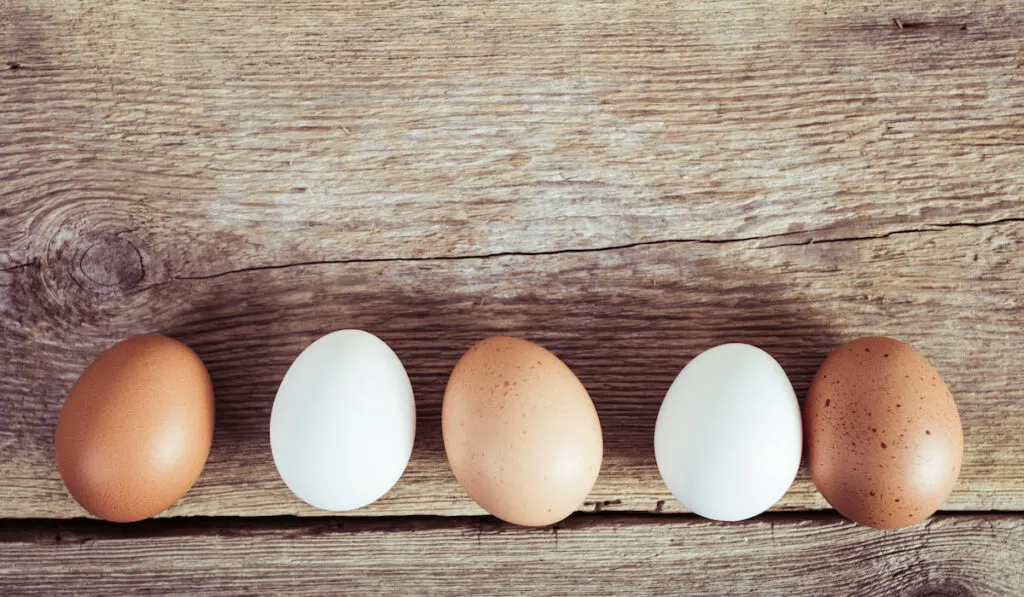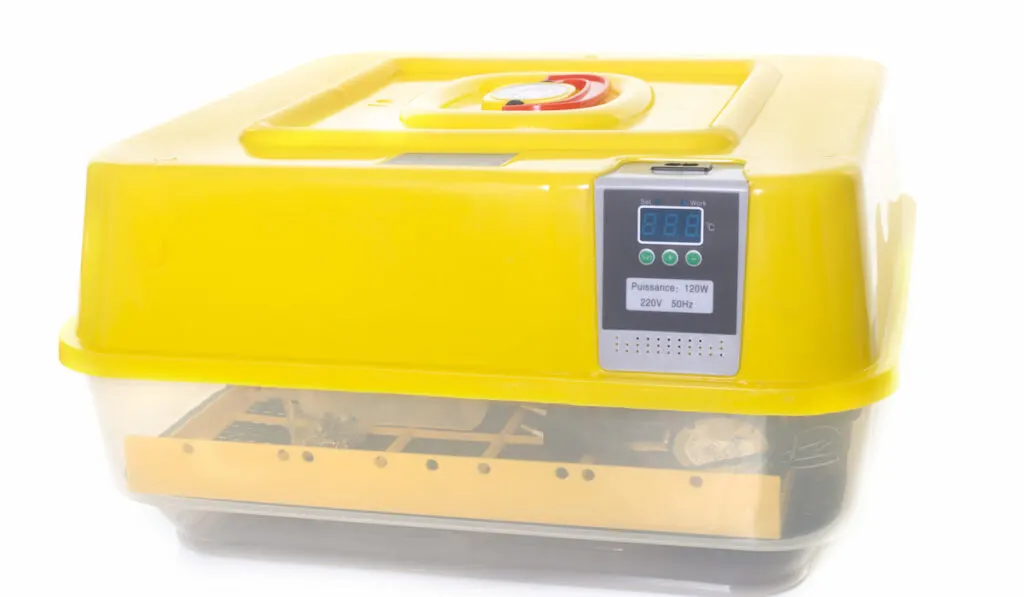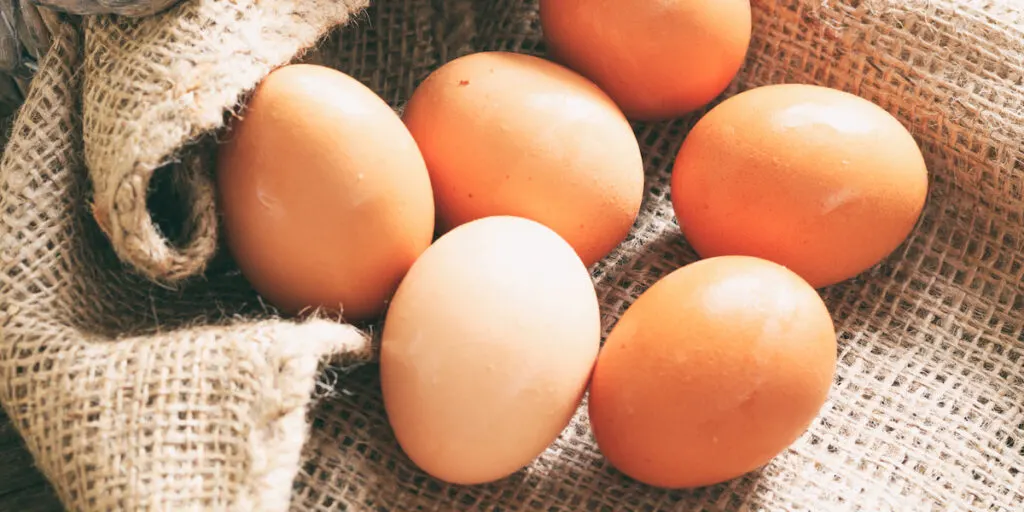We all know that you can raise chickens and ducks together. If you have both types of animals and are interested in incubating the eggs yourself, you might be wondering if you can incubate them together. While these birds may appear to have a lot in common when it comes to egg laying, there is more to it than meets the eye.
Can you incubate duck and chicken eggs together?
Duck and chicken eggs can be incubated together, but you should consider differences in the incubation process for each including duration, required temperature, and humidity.
Let’s explore some key differences between duck and chicken eggs when it comes to incubation.

Table of Contents
Duck and Chicken Egg Incubation Requirements and Differences
Duck and chicken eggs share some common characteristics. However, differences in size and shell composition affect the duration, temperature, and humidity needs of duck and chicken eggs for incubation.
Size
Duck eggs are generally larger than chicken eggs. The size difference is usually noticeable when holding the eggs in your hands.
Egg size is an important consideration during incubation because most incubators come with turners the size of a particular egg. If the turners of your incubator are designed for chicken eggs, they might not turn duck eggs properly. You can fix this by buying separate turners for both eggs.
Shell
Duck egg shells are tougher than chicken eggs. Even though they appear tougher, you should not roughly handle the eggs. The texture of the egg determines the brightness of light you should use when candling (inspecting) the eggs.
Note: We will discuss candling eggs in more detail later in this article.
Duration of Incubation
It takes 21 days for chicken eggs to hatch. Duck eggs, however, require 28-35 days to hatch. This means that you cannot start the incubation process at the same time for both eggs.
Generally, people start to incubate duck eggs at least 7 days before they start to incubate chicken eggs.
The duration of incubation for duck eggs also depends on the duck breed. Be sure to research the recommended incubation period specific to your breed of duck. For example, Pekin ducks hatch in 28 days while Muscovy ducks requires 35 days.
Temperature
Most homesteaders agree that the optimum temperature to incubate duck and chicken eggs is 99.5°F (37.5°C). When the eggs are transferred to hatcher trays (to prepare them to hatch), the temperature may reduce to 99°F (37.2°C). While in the hatcher, the temperature drops toward 97°F (36.1°C).
Note: Eggs should be kept in the hatcher for at least 3 days. This means that chicken eggs should go into the hatcher when they are 18 days old while ducks like Pekins should go in when they are 25 days old.
Humidity
The humidity in the incubator should be around 55% for both eggs. While in the hatcher, the eggs require a higher humidity of 65-75%. Be sure to monitor the humidity so that your eggs do not dry out or become too wet.
Now that you know some of the incubation requirements and differences for duck and chicken eggs, you can learn the process involved for incubating both egg types.

How to Incubate Duck and Chicken Eggs
Let us assume that you have calculated the duration of incubating both eggs (specific to your breeds), and you have your supplies ready (fertile eggs, incubator, torch, cloth, etc.). Are you ready to incubate some eggs?
1. Get the Eggs
Some people think that they can incubate store-bought eggs. However, most eggs sold in shops are unfertilized. Layer chickens can lay eggs through a process called parthenogenesis. (Source)
To get fertilized (or fertile) eggs, you need to collect them from brooding hens and not commercial layers. You can ask a local homesteader with poultry for fertile eggs. In spring, some feed stores might have fertile eggs for sale. You can also search on the web for people who sell fertile eggs near you.
When sourcing eggs, choose a seller closer to you to limit damaging the eggs during transport. You should also avoid selecting dirty, double-yolk, undersized, oversized, or misshapen eggs.
2. Prepare the Incubator
You should not place the eggs in the incubator immediately when you return home with them. You can keep the eggs in your garage or basement (at around 55°F) while you prepare the incubator.
Before setting the eggs, make sure that the incubator has been on for at least 24 hours. This is necessary to get the optimum temperature (95°F) and humidity (55%) before you introduce the eggs.
3. Incubate the Eggs
When everything is set, you should introduce the eggs into the incubator. As a tip, you should check the incubator every 12 hours to make sure that it is working properly. Do not leave the incubator open. Try to limit the how often you open the incubator since this can alter the temperature and humidity.
Some incubators include automatic turners that reduce how much attention you need to give them. Turners help ensure that an even temperature reaches every part of the eggs.
If you do not have turners, you can manually turn the eggs. To manually turn eggs, use a marker and mark an O and X on opposite sides of eggs. These markings will help you to know whether you turned the egg or not.
You should turn the eggs at least 3 times daily. You can increase how often you turn the eggs, but make sure that the number of times you turn the eggs is an odd number (i.e. 3, 5, 7, etc.). If you turn them at an even interval, the eggs will not be evenly exposed to the correct temperature on all sides.
4. Measure Your Progress
You can measure egg incubation progress in two ways:
- Measuring their weight
- Candling the eggs
Fresh eggs have more water (and therefore more weight) than eggs that are about to hatch. If the eggs are becoming lighter, they are making progress in their incubation. Take a baseline weight for the eggs to compare to throughout the process.
You can also observe the incubation process with light using candling. To candle an egg, point a bright light at one end of the egg while you look through the other end. This is more effective when done in a dark room.
You should inspect the eggs for the growth of veins and tissues. If an egg appears cloudy, it may be dead. If an egg is clear, it may be infertile. You should remove dead and infertile eggs from the incubator.
5. Lockdown
The lockdown phase is when you keep the eggs in the hatcher. Remember that eggs need to be in the hatcher 3 days before their expected day of hatching.
The initial temperature should be 99°F and the humidity should be controlled at 65% when placing the eggs in the hatcher. As the eggs begin to pip, increase the humidity to 80%. When the eggs appear close to hatching, gradually reduce the temperature to 97°F and the humidity to 90%. You should increase the ventilation of the incubator before the hatch.
As the ventilation increases and the humidity drops, the eggs will start to dry up. When most of them are dry (at least 90% of them), remove the eggs from the hatcher.
6. Hatching the Eggs
It is normal (and cute) to see the eggs moving. However, do not try to help the ducklings and chicks hatch since touching them could injure them. The ducklings and chicks will need time to adjust their lungs to match the outside environment. When they are ready, they will hatch by themselves.

Other Useful Tips for Incubating Duck and Chicken Eggs
Keep these tips in mind throughout the incubation process for a successful experience:
- Do not wash soiled eggs. Use a clean cloth and gently wipe them.
- Always refill the water when it goes low to maintain humidity.
- Remember to clean and disinfect the incubator before you use it.
- Make sure the incubator is well ventilated .
- Ask someone experienced to guide you when incubating your first set of eggs.
Final Thoughts
You can incubate duck and chicken eggs together. Just be sure to take note of how their size and shell can affect incubation duration, temperature settings, and humidity requirements.
When do you intend to incubate a set of eggs? Will you incubate duck and chicken eggs together? Share your thoughts in the comment section below.
Sources
- https://www.vet.cornell.edu/animal-health-diagnostic-center/programs/duck-research-lab/hatching-duck-eggs
- https://modernfarmer.com/2015/04/how-to-incubate-chicken-eggs/
- https://thefreerangelife.com/duck-eggs-vs-chicken-eggs-whats-the-difference/
- https://backyardpoultry.iamcountryside.com/eggs-meat/incubating-duck-eggs-with-chicken-eggs/
- http://www.thechosenweeds.com/duck-eggs-versus-chicken-eggs/
